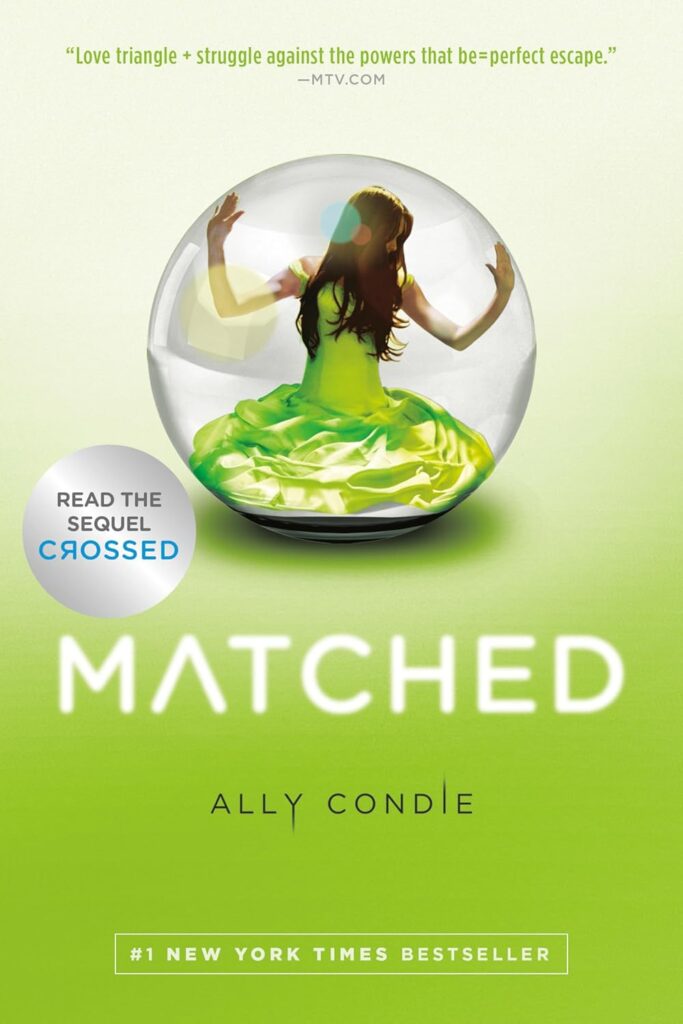Imagine a world where every decision in your life is made for you—who you marry, where you work, even when you die. It’s a world of control, a world where freedom doesn’t really exist. Matched, by Ally Condie, takes you straight into that dystopian reality, where the government (referred to as the Society) believes they know what’s best for you, down to the smallest detail. But is that really the best way to live?
The story centers around Cassia Reyes, a young girl who has always trusted the Society to make her decisions. She’s lived her life content, following the rules. But, as you’d expect, things don’t stay smooth for long. That’s when her world—and everything she thought she knew—begins to crumble.
1. The Society: Perfect on the Surface, Dark Underneath
The Society is presented as this flawless organization. People don’t have to worry about their careers, their diets, or even who they’ll marry because every decision is supposedly optimized for their happiness. It’s like living in a perfectly controlled, happy bubble, right? Well, not quite. Once you scratch the surface, it becomes clear that this “perfection” comes with a price—your freedom.
In Matched, the Society runs everything. You get matched with your perfect partner at the age of 17, based on compatibility algorithms. No dating, no awkward first meetings—just a big banquet where your match is revealed. Cassia is excited to be matched with her best friend Xander, someone she already knows and trusts. But then the unthinkable happens. Another face flashes on her screen for a split second: Ky, a quiet boy who’s not supposed to be part of the matching pool. And that’s where everything starts to unravel.
Cassia’s sudden exposure to the possibility of choice—a choice the Society was supposed to have already made for her—sends her into a whirlwind of doubt. What if the Society doesn’t actually know what’s best for her? This moment sparks her inner rebellion, one that unfolds slowly, but deeply.

2. Cassia’s Journey: From Trusting to Questioning
At the beginning of the book, Cassia is a firm believer in the Society. Why wouldn’t she be? They’ve always provided her with security and order. But that moment with Ky’s face appearing unexpectedly on her matching screen turns her world upside down. She starts to wonder if her life is truly hers or if she’s just a pawn in the Society’s grand scheme.
What’s compelling about Cassia’s journey is how relatable it feels. We’ve all had moments in life where we suddenly question the things we’ve always believed in. Maybe it’s the system, the rules we follow, or even our own choices. Cassia’s questioning doesn’t happen in a dramatic, explosive way—it’s slow and subtle, like a creeping sense of unease that grows with every new discovery.
The love triangle that forms between Cassia, Xander, and Ky isn’t just a romantic subplot. It’s symbolic of Cassia’s internal struggle. Xander represents safety and the familiar—a future that’s been carefully laid out for her. Ky, on the other hand, symbolizes the unknown, the risk of stepping outside the Society’s rules and choosing her own path. Watching Cassia navigate these two worlds is what makes her story so engaging. You can’t help but ask yourself: If you were in her shoes, would you stay on the safe, predetermined path, or would you risk everything for a shot at real freedom?
3. The Power of Choice (or Lack Thereof)
At the heart of Matched is the idea of choice—or, more accurately, the lack of it. The Society believes that by removing choice, they can create a utopia where everything is optimized for happiness. There’s no room for mistakes, no wrong turns, no bad decisions. But Cassia’s journey challenges that idea. Is a life without choice really worth living, even if it’s safe and comfortable?
As Cassia delves deeper into the Society’s rules, she begins to realize how much has been taken from her—and not just her ability to choose a partner. She starts to see the restrictions in every aspect of her life: the jobs people are assigned, the foods they are allowed to eat, the very emotions they are permitted to feel. Even art and poetry are controlled, with only approved works allowed to exist. The more she questions, the more she realizes that without choice, she isn’t really living at all.
This theme of choice is what makes Matched more than just a dystopian romance. It’s a thought-provoking exploration of what it means to live a truly authentic life. We all crave security, but at what cost? Cassia’s journey makes us think about the balance between safety and freedom, and how much control we’re willing to give up for the promise of a perfect life.
4. A Love Story Wrapped in Rebellion
While Matched explores some heavy themes, it’s still, at its core, a love story. Cassia’s feelings for Ky grow throughout the book, and their relationship serves as a catalyst for her rebellion against the Society. It’s through Ky that Cassia starts to see the cracks in the Society’s perfect facade. He’s lived a life on the fringes, always aware that the Society’s control isn’t as benevolent as it seems.
Ky’s presence challenges everything Cassia thought she knew. He introduces her to forbidden ideas, including the concept of creating something purely for yourself, whether it’s art or a personal choice. Their relationship is built on quiet moments, shared secrets, and the growing realization that the Society’s rules don’t allow for real love—at least not the kind that involves risk, passion, and true connection.
Cassia’s relationship with Ky isn’t just about romance. It’s about finding someone who makes her question the world around her, someone who encourages her to take control of her own destiny. And as their bond deepens, so does Cassia’s desire to break free from the Society’s control. The love story may be a driving force, but it’s also a vehicle for something bigger: Cassia’s fight for personal autonomy.
5. The Bigger Picture: Control and Resistance
As Matched progresses, you realize that this story is about more than just one girl’s journey of self-discovery. It’s a commentary on control, both on a personal and societal level. The Society controls every aspect of its citizens’ lives, from their relationships to their careers and even their lifespan. In a way, it feels eerily familiar to the subtle controls we experience in our own world—whether it’s through technology, government, or social expectations.
What Matched does so well is show how control doesn’t always come in the form of violent oppression. Sometimes, it’s much more subtle. The Society presents itself as caring, providing, and protective. But underneath that protective layer is a system that takes away your agency, your choices, and ultimately, your humanity.
As Cassia begins to push back, we see the first sparks of resistance. It’s not an all-out war, at least not yet. It’s quiet rebellion—choosing to read forbidden poems, falling in love with someone you weren’t supposed to, questioning the rules that have been in place for so long. And that’s what makes this story so powerful. Resistance doesn’t always start with a bang. Sometimes, it starts with a whisper, a quiet question, or a hidden act of defiance.
6. Conclusion
In a world where every choice is made for you, what would you do? Would you accept the security that comes with that kind of control, or would you risk everything to make your own decisions? As I reflected on Cassia’s journey, I couldn’t help but wonder: How much control are we willing to surrender for the promise of a perfect life? Would we really be better off, or is there something essential about having the freedom to choose—even if it means making mistakes along the way?
7. Related Articles
You may also find the following articles helpful:
Matched Book Summary: Key Insights and Themes from the Bestseller




